Cancer Cytogenetics Solutions
Cytogenetic Studies of Cancer
Chromosome alterations commonly found in cancer cells include gene fusions, gross chromosomal rearrangements, and copy number variants. The chromosomal aberrations involved in cancer are often assessed through cytogenetic analysis, which is an integral part of current genomic clinical research.
Cytogeneticists can now use complementary microarray and next-generation sequencing (NGS) technologies for thorough analysis of chromosomal changes in cancer to obtain a comprehensive view of genomic alterations, both large and small.
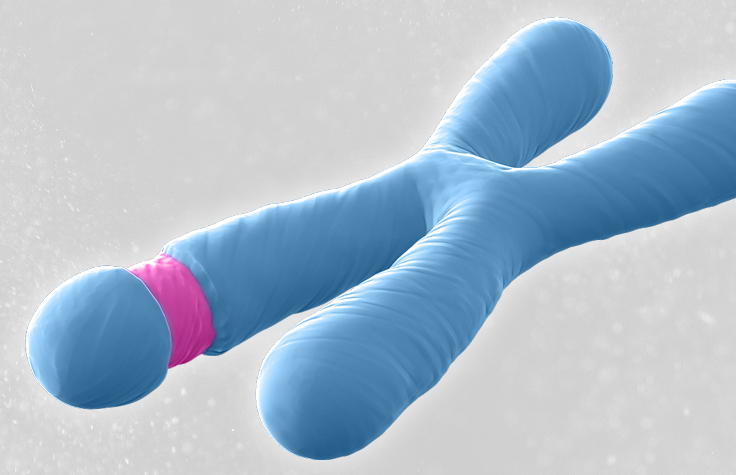
Arrays: An Effective Research Tool for Cancer Cytogenetic Screening
Many scientists now use microarrays as a screening tool for increasing their understanding of cancer cytogenetics. Traditional methods for assessing chromosomal abnormalities, including fluorescence in situ hybridization (FISH) and karyotyping, generally provide low resolution, resulting in more limited data.1 Arrays offer a simple, reliable method for identifying copy number changes and unbalanced translocations with high resolution and high throughput.
Learn MoreNGS: A Comprehensive View of Cancer Cytogenetics
By providing a base-by-base view of the entire genome, NGS can identify point mutations, small indels, and gene fusion breakpoints. This information can help to identify molecular subtypes, prognostic biomarkers, and other indicators that can inform therapeutic strategies.
Learn MoreWhy Cytogeneticists Are Using NGS with FISH
Labs are inundated with samples, so gaining efficiency is critical. NGS can complement FISH, saving you time and money, while enabling you to meet best practices for analyzing samples with unknown abnormalities.
View Infographic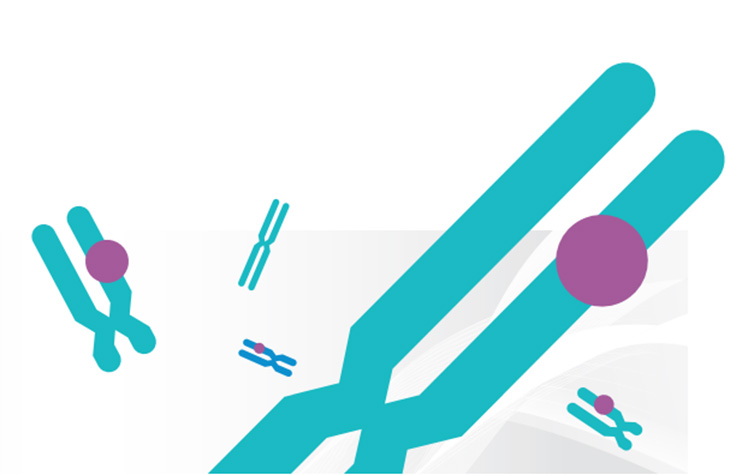
Our Products
By combining NGS and microarrays, clinical researchers can obtain a comprehensive view of cancer cytogenetics.
Illumina products facilitate clinical cancer research by providing expert-defined gene content2,3,4, accurate data, and simple analysis and reporting options.
Click on the below to view products for each workflow step.
Designed by international consortia to provide the most comprehensive coverage of cytogenetically relevant genes for cancer studies.
Sequencing System
NextSeq 550 SystemPerform sequencing and high-quality cytogenomic array scanning, all on a single system.
Sequencing Kits
TruSight RNA FusionA gene fusion detection panel targeting fusion associated genes in many cancer types with the ability to detect known and novel fusion gene partners.
TruSight Tumor 15Focused panel to assess relevant solid tumor somatic variants in a simple, sample-to-data workflow.
TruSight Myeloid Sequencing PanelExpert-defined panel* targeting oncogenic exons and tumor suppressor genes for myeloid malignancies.
* List of experts on file.
Intuitive software that provides molecular cytogenetic and Preimplantation Genetic Screening (PGS) data analysis in a single framework.
Local Run ManagerEasy-to-use software for automated on-instrument data analysis.
Easy-to-use software for analysis and variant calling on the MiSeq System.
BaseSpace Sequence HubThe Illumina genomics computing environment for NGS data analysis and management.
Interested in receiving newsletters, case studies, and information on genomic analysis techniques? Enter your email address.
Learn More
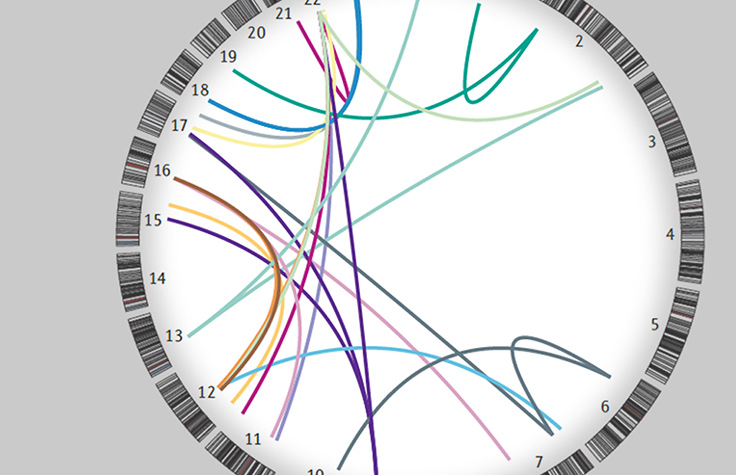
Novel Fusions and Pharmacogenomic Targets in Cancer
Learn about the optimization and validation of commercially available clinical NGS assays.
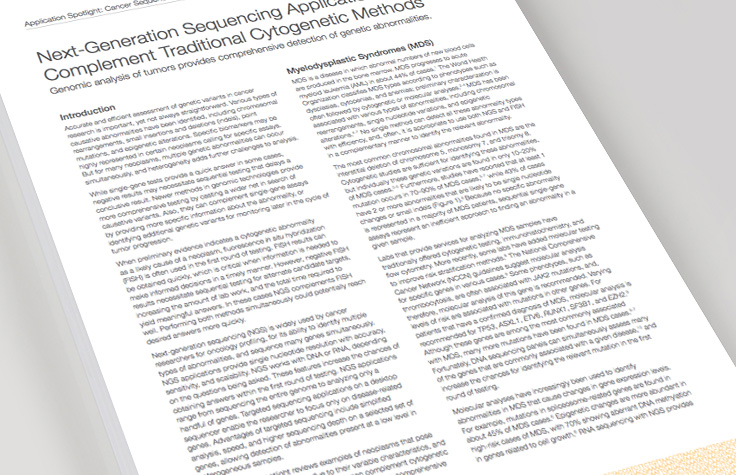
NGS Complements Traditional Cytogenetic Methods
Genomic analysis of tumors provides comprehensive detection of genetic abnormalities.
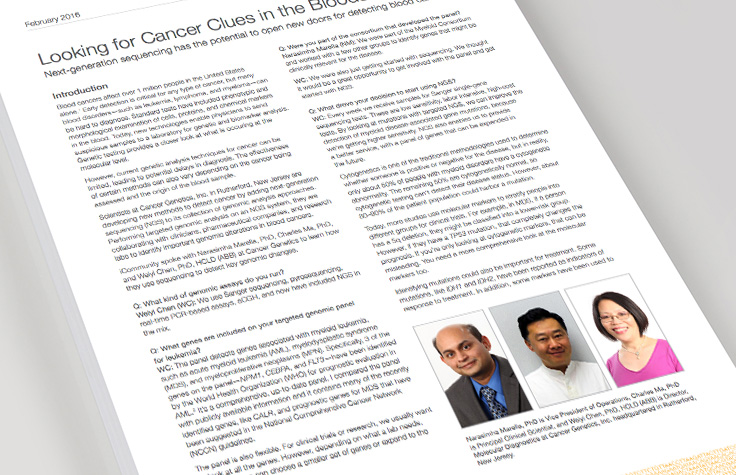
NGS to Detect Blood Cancers
Targeted NGS can identify myeloid-related genes with greater sensitivity than Sanger sequencing or cytogenetic methods.
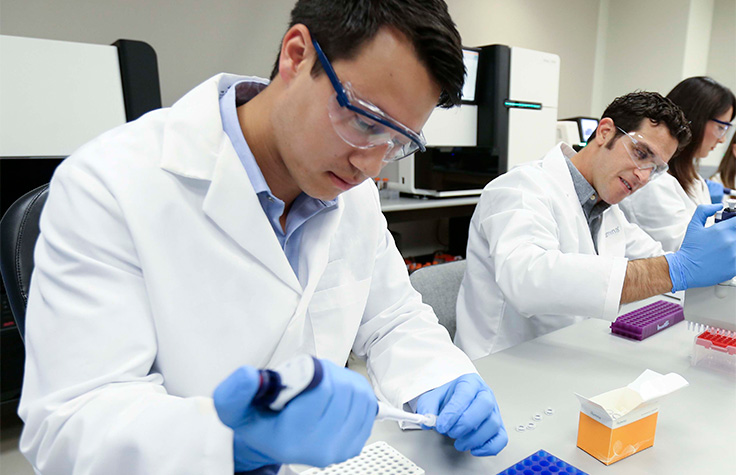
Comprehensive Panel for Gene Fusion Detection
Ravindra Kolhe, MD, PhD, discusses using the TruSight RNA Fusion Panel to study gene fusions in cancer.
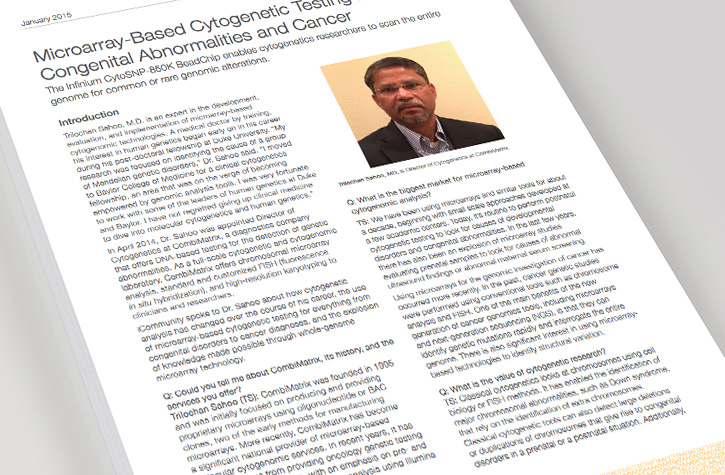
Cytogenetics Expert Interview
Dr. Trilochan Sahoo, Director of Cytogenetics at Combimatrix, discusses array-based cancer cytogenetic analysis.
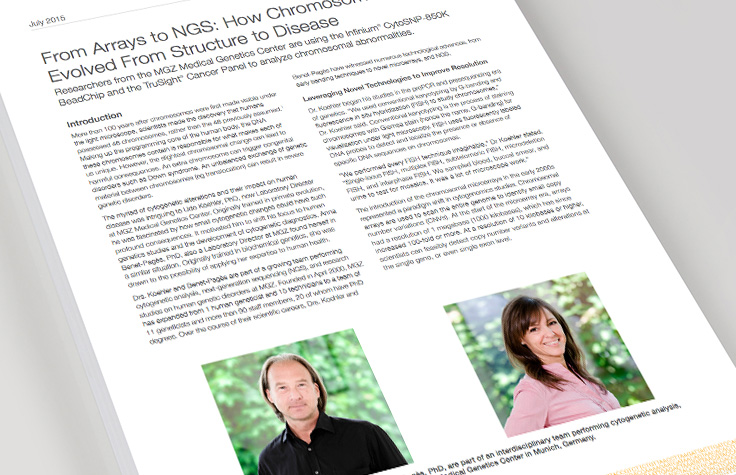
Array + NGS Chromosomal Studies
Lab analyzes chromosomal abnormalities and disease connection.
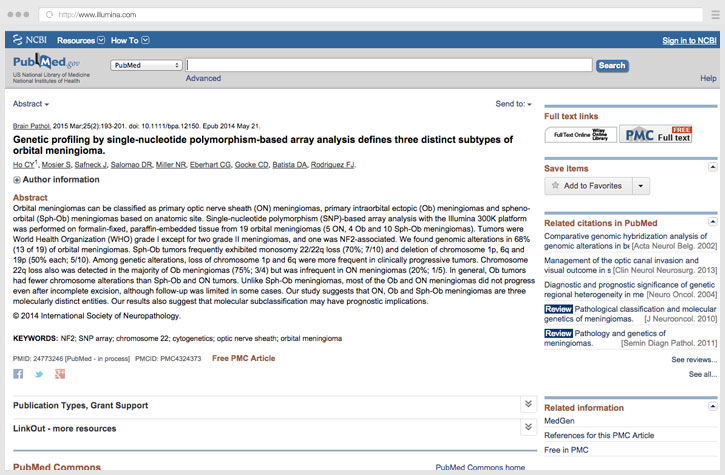
Cancer Cytogenetics Study Identifies Meningioma Subtypes
Ho et al. identify 3 distinct subtypes of orbital meningioma via genetic profiling with microarrays.
References
- PROFOUND. Molecular Cytogenetics (FISH, Fluorescent In Situ Hybridization, Array-Based). Rep. no. 271067. N.p.: Global Industry Analysts, 2016. Print.
- International Collaboration for Clinical Genomics
- Cancer Genomics Consortium
- Conlin LK, Thiel BD, Bonnemann CG, et al. Mechanisms of mosaicism, chimerism and uniparental disomy identified by single nucleotide polymorphism array analysis. Hum Mol Genet. 2010;19(7):1263-75. doi: 10.1093/hmg/ddq003.